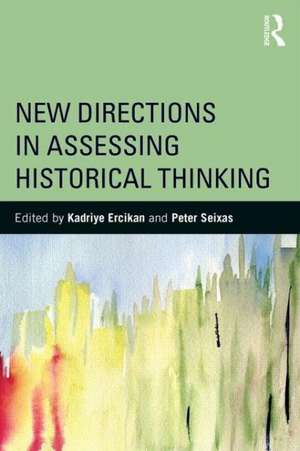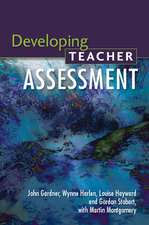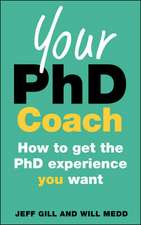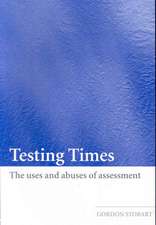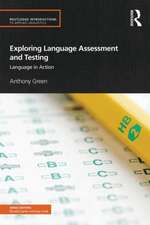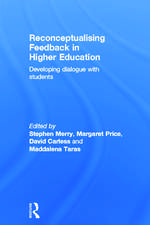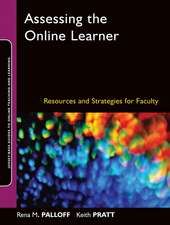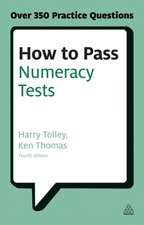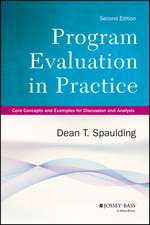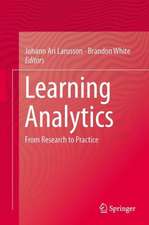New Directions in Assessing Historical Thinking
Editat de Kadriye Ercikan, Peter Seixasen Limba Engleză Paperback – 4 mar 2015
For this volume, Kadriye Ercikan and Peter Seixas have assembled an international array of experts who have, collectively, moved the fields of history education and assessment forward. Their various approaches negotiate the sometimes-conflicting demands of theoretical sophistication, empirically demonstrated validity and practical efficiency. Key issues include articulating the cognitive goals of history education, the relationship between content and procedural knowledge, the impact of students’ language literacy on history assessments, and methods of validation in both large scale and classroom assessments. New Directions in Assessing Historical Thinking is a critical, research-oriented resource that will advance the conceptualization, design and validation of the next generation of history assessments.
| Toate formatele și edițiile | Preț | Express |
|---|---|---|
| Paperback (1) | 383.57 lei 3-5 săpt. | +10.98 lei 10-14 zile |
| Taylor & Francis – 4 mar 2015 | 383.57 lei 3-5 săpt. | +10.98 lei 10-14 zile |
| Hardback (1) | 1047.44 lei 6-8 săpt. | |
| Taylor & Francis – 10 mar 2015 | 1047.44 lei 6-8 săpt. |
Preț: 383.57 lei
Nou
Puncte Express: 575
Preț estimativ în valută:
73.39€ • 76.84$ • 60.73£
73.39€ • 76.84$ • 60.73£
Carte disponibilă
Livrare economică 15-29 martie
Livrare express 04-08 martie pentru 20.97 lei
Preluare comenzi: 021 569.72.76
Specificații
ISBN-13: 9781138018273
ISBN-10: 1138018279
Pagini: 284
Ilustrații: 24 black & white illustrations, 16 black & white tables
Dimensiuni: 152 x 229 x 15 mm
Greutate: 0.15 kg
Ediția:1
Editura: Taylor & Francis
Colecția Routledge
Locul publicării:Oxford, United Kingdom
ISBN-10: 1138018279
Pagini: 284
Ilustrații: 24 black & white illustrations, 16 black & white tables
Dimensiuni: 152 x 229 x 15 mm
Greutate: 0.15 kg
Ediția:1
Editura: Taylor & Francis
Colecția Routledge
Locul publicării:Oxford, United Kingdom
Cuprins
Preface
Acknowledgements
Contributor Biographies
Introduction
Part I: Goals of History Education: Models of Historical Cognition and Learning
1 Historical Consciousness in Germany: Concept, Implementation, Assessment
Carlos Kölbl & Lisa Konrad
2 The Difficulty of Assessing Disciplinary Historical Reading
Abby Reisman
3 Heritage as a Resource for Enhancing and Assessing Historical Thinking: Reflections from the Netherlands
Carla van Boxtel, Maria Grever & Stephan Klein
4 Relating Historical Consciousness to Historical Thinking through Assessment
Catherine Duquette
Commentary 1 Into the Swampy Lowlands of Important Problems
Robert B. Bain
Part 2: Issues in Designing Assessments of Historical Thinking
5 Assessing for Learning in the History Classroom
Bruce VanSledright
6 Historical Thinking, Competencies and their Measurement: Challenges and Approaches
Andreas Körber & Johannes Meyer-Hamme
7 A Design Process for Assessing Historical Thinking: The Case of a One-Hour Test
Peter Seixas, Lindsay Gibson & Kadriye Ercikan
8 Material-based and Open-ended Writing Tasks for Assessing Narrative Competence among Students
Monika Waldis, Jan Hodel, Holger Thünemann, Meik Zülsdorf-Kersting, & Beatrice Ziegler
Commentary 2 Historical Thinking: In Search of Conceptual and Practical Guidance for the Design and Use of Assessments of Student Competence
Josh Radinsky, Susan R. Goldman, James W. Pellegrino
Part 3: Large-scale Assessment of Historical Thinking
9 A Large-Scale Assessment of Historical Knowledge and Reasoning: NAEP U.S. History
Stephen Lazer
10 Assessing Historical Thinking in the Redesigned Advanced Placement United States History Course and Exam
Lawrence G. Charap
11 Historical Consciousness and Historical Thinking Reflected in Large-scale Assessment in Sweden
Per Eliasson, Fredrik Alvén, Cecilia Axelsson Yngvéus, & David Rosenlund
Commentary 3 Assessment of Historical Thinking in Practice
Susan M. Brookhart
Part 4: Validity of Score Interpretations
12 The Importance of Construct Validity Evidence in History Assessment: What is Often Overlooked or Misunderstood?
Pamela Kaliski, Kara Smith, & Kristen Huff
13 Cognitive Validity Evidence for Validating Assessments of Historical Thinking
Kadriye Ercikan, Peter Seixas, Juliette Lyons-Thomas, & Lindsay Gibson
14 Measuring Up?: Multiple-Choice Questions
Gabriel A. Reich
15 History Assessments of Thinking: An Investigation of Cognitive Validity
Mark Smith & Joel Breakstone
Commentary 4 The Validity of Historical Thinking Assessments: A Commentary
Denis Shemilt
Acknowledgements
Contributor Biographies
Introduction
Part I: Goals of History Education: Models of Historical Cognition and Learning
1 Historical Consciousness in Germany: Concept, Implementation, Assessment
Carlos Kölbl & Lisa Konrad
2 The Difficulty of Assessing Disciplinary Historical Reading
Abby Reisman
3 Heritage as a Resource for Enhancing and Assessing Historical Thinking: Reflections from the Netherlands
Carla van Boxtel, Maria Grever & Stephan Klein
4 Relating Historical Consciousness to Historical Thinking through Assessment
Catherine Duquette
Commentary 1 Into the Swampy Lowlands of Important Problems
Robert B. Bain
Part 2: Issues in Designing Assessments of Historical Thinking
5 Assessing for Learning in the History Classroom
Bruce VanSledright
6 Historical Thinking, Competencies and their Measurement: Challenges and Approaches
Andreas Körber & Johannes Meyer-Hamme
7 A Design Process for Assessing Historical Thinking: The Case of a One-Hour Test
Peter Seixas, Lindsay Gibson & Kadriye Ercikan
8 Material-based and Open-ended Writing Tasks for Assessing Narrative Competence among Students
Monika Waldis, Jan Hodel, Holger Thünemann, Meik Zülsdorf-Kersting, & Beatrice Ziegler
Commentary 2 Historical Thinking: In Search of Conceptual and Practical Guidance for the Design and Use of Assessments of Student Competence
Josh Radinsky, Susan R. Goldman, James W. Pellegrino
Part 3: Large-scale Assessment of Historical Thinking
9 A Large-Scale Assessment of Historical Knowledge and Reasoning: NAEP U.S. History
Stephen Lazer
10 Assessing Historical Thinking in the Redesigned Advanced Placement United States History Course and Exam
Lawrence G. Charap
11 Historical Consciousness and Historical Thinking Reflected in Large-scale Assessment in Sweden
Per Eliasson, Fredrik Alvén, Cecilia Axelsson Yngvéus, & David Rosenlund
Commentary 3 Assessment of Historical Thinking in Practice
Susan M. Brookhart
Part 4: Validity of Score Interpretations
12 The Importance of Construct Validity Evidence in History Assessment: What is Often Overlooked or Misunderstood?
Pamela Kaliski, Kara Smith, & Kristen Huff
13 Cognitive Validity Evidence for Validating Assessments of Historical Thinking
Kadriye Ercikan, Peter Seixas, Juliette Lyons-Thomas, & Lindsay Gibson
14 Measuring Up?: Multiple-Choice Questions
Gabriel A. Reich
15 History Assessments of Thinking: An Investigation of Cognitive Validity
Mark Smith & Joel Breakstone
Commentary 4 The Validity of Historical Thinking Assessments: A Commentary
Denis Shemilt
Notă biografică
Kadriye Ercikan is Professor of Measurement, Evaluation, and Research Methodology, Faculty of Education, University of British Columbia, Canada.
Peter Seixas is Professor of History Education, Faculty of Education, University of British Columbia, Canada.
Peter Seixas is Professor of History Education, Faculty of Education, University of British Columbia, Canada.
Descriere
New Directions in Assessing Historical Thinking is a critical, research-oriented resource that will advance the conceptualization, design and validation of the next generation of history assessments.
